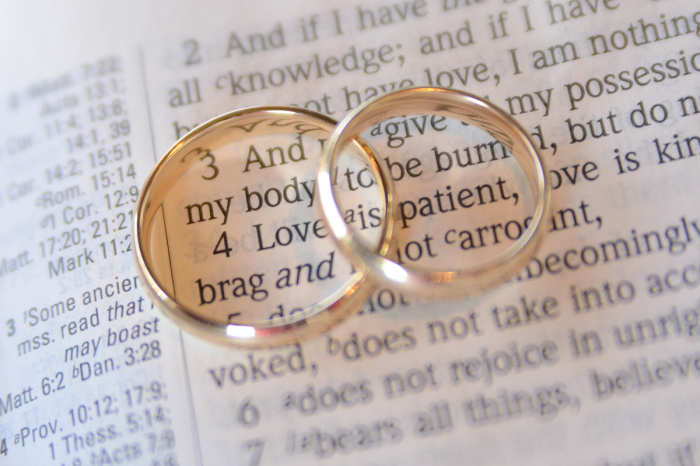Orthodox, Catholic leaders recommend taking steps to recognize interfaith marriages

Religious leaders from two separate Christian denominations have made recommendations for actions each should take to accommodate spouses in mixed marriages with a member of the other denomination as each indicated that reunification between the two branches won't be happening anytime soon.
A group of Orthodox and Catholic Church leaders have compiled a new document called “The Pastoral Care of Mixed Marriages: Neither Yours nor Mine—But Ours.” The document, released last week and crafted last May by a coalition called the North American Orthodox-Catholic Theological Consultation, outlines a course of action the two churches should take to address the increased prevalence of interfaith marriages comprising members of both denominations while stopping short of issuing policy changes.
Members of the North American Orthodox-Catholic Theological Consultation, which dates back to 1965, include: Orthodox Co-Chairman Metropolitan Methodios, Catholic Co-Chairman Cardinal Joseph Tobin of the Archdiocese of Newark, Orthodox Interim Co-Secretary the Rev. Dr. Nicolas Kazarian, and Catholic Co-Secretary the Rev. Brian Daley. The document was created at the Consultation’s gathering at St. Augustine’s Seminary of Toronto in Ontario, Canada.
The document acknowledges the division between the Orthodox and Catholic Church while stressing that “we must shepherd our flocks and care for the people of God, especially when Catholic and Orthodox faithful enter into mixed marriages.”
It begins by noting the history of joint statements on marriage between the two churches, concluding with the 1990 “Johnstown statement” summarized as “dividing the parties in a mixed marriage into yours and mine.”
The religious leaders who compiled the document suggested embracing a new “starting principle” for mixed marriages that included “a joint solicitude for the spouses” and a focus on “the pastoral care of each mixed marriage as our concern.” The document laments that “many increasingly view the institution of marriage as superfluous and unnecessary” and that “where matrimony does occur, civil marriage is becoming normative for many people.”
“It is in this context that our churches must continue to shepherd the flock,” the document added. Recommendations developed by the religious leaders from both denominations took into account Catholic and Orthodox teachings on marriage.
After explaining that “an Orthodox bishop or priest is required to be present at a wedding, to bless this union with special prayers” in order for a marriage to be considered valid in the Orthodox Church, the document recommends that “the Catholic party of the proposed marriage with an Orthodox be married with the Orthodox bishop or priest officiating, after consultation by the partners with their pastors, and with an official dispensation, for the Catholic partner, from ecclesiastical form.”
Another recommendation in the document calls on the Orthodox Church “to consider the extension of ecclesiastical economy to Orthodox parties in legal contractual unions that have been established through the exchange of matrimonial consent and made with the intention of a lifelong bond in the Catholic liturgical and canonical tradition.”
It noted that this economy would only be extended to the Orthodox spouse to enable him or her to continue serving as a member of the Orthodox Church in good standing even though they are in a Catholic marriage.
After highlighting the differences in views between the Orthodox and Catholic Churches on divorce and remarriage, the document suggests that “Catholic hierarchs seek ways to receive the pastoral decisions of Orthodox spiritual courts and hierarchs and not only recognize, with the Orthodox hierarchy, the remarriages, in some carefully examined cases, of divorced spouses in mixed marriages, but also allow such divorced and remarried Catholic parties in mixed marriages with Orthodox Christians eucharistic participation in the Catholic Church.”
Additional recommendations offered in the document ask “that both churches exercise their responsibilities for the pastoral care of spouses and their children in mixed marriages jointly in a spirit of love and mutual respect” and “that both churches exercise their responsibilities for the pastoral care of spouses and their children in mixed marriages jointly in a spirit of love and mutual respect.”
The document concluded by recommending that “materials for Christian marriage and family life be updated and jointly developed, both for the guidance of the clergy and for the use of the people involved in Orthodox-Catholic marriages” and that “these materials accurately reflect both the pastoral preparation and the decision-making required prior to any wedding to avoid indifferentism and spiritual confusion.”
The United States Conference of Catholic Bishops released a statement on March 5 insisting that “this new text does not speak officially for either Church.” At the same time, the body of bishops praised the document as the creation of “a group of experienced theologians highly esteemed by their peers” that was “submitted to all the members of both Churches for their prayerful reflection and discussion.”
Ryan Foley is a reporter for The Christian Post. He can be reached at: ryan.foley@christianpost.com




























